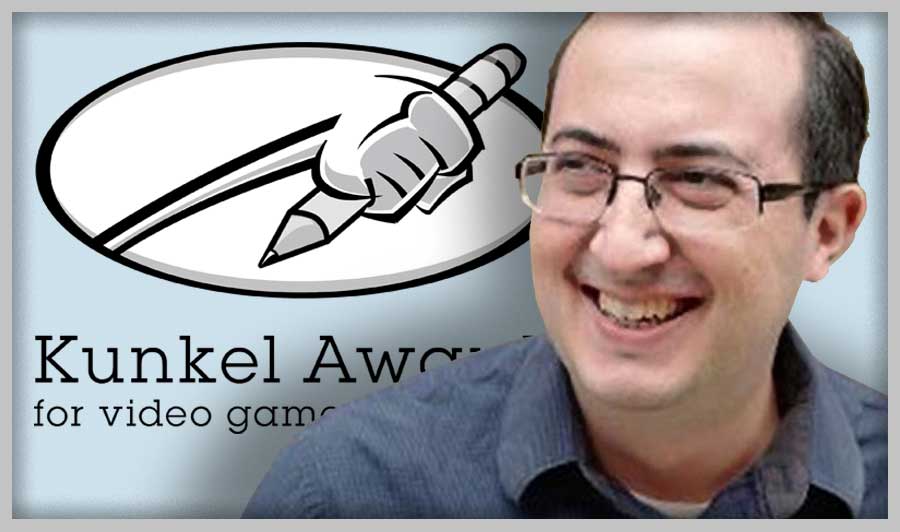This journalist just won first, second, and third place for Best News Reporting. And man, is he pissed.
His name is Jason Schreier, and he’s the news editor at Kotaku, a Gawker-owned website that covers videogames. He also writes, and he’s pretty damn good at it. Last week, he won all three places in the news reporting category of the Kunkel Awards.
It’s the first time that’s ever happened, which is less impressive when you consider: The Kunkels are three years old. Run by the Society of Professional Journalists, they’re the only awards for videogame journalists.
Schreier is unimpressed and unhappy…
…and as you’ll see later, he also tweeted the “Gamergate-created” Kunkels are “a despicable joke.”
If you don’t know anything about GamerGate, three quick things…
- You’re lucky.
- It was a social media shitshow from 2014-15 that purported to be about journalism ethics but inflicted all sorts of horrible abuse under its moniker.
- When I tried to talk to both sides, each accused me of favoring the other.
Three years ago this month, here’s how I defined GamerGate, and how I got sucked into it. It led to an SPJ-sponsored discussion I crappily hosted – there’s a reason I’m not a broadcaster – and then to the Kunkel Awards, which I created as an SPJ national board member.
I ran the Kunkels for the first two years, turning them over to a young journalist named Brittany Ferrendi this year. Neither she nor the current judges know much about GamerGate, and they care even less.
As Ferrendi told me yesterday: “When GamerGate was happening, I was a sophomore in college working two jobs. When I started as Kunkel director, all I knew about GamerGate was the name.”
So it’s fascinating that Schreier is publicly insulting some of his fellow journalists – and they don’t even understand the insult.
It’s also weird that he thinks GamerGate “created” the Kunkels or “demanded” I do it. Especially since he’s never talked to me or Ferrendi. You’d think an award-winning journalist would do that before publishing stuff.
Schreier’s odd outburst has brought me back three years. I can now reflect on an irony: I got involved with GamerGate to teach journalism to assholes, but GamerGate taught me about journalists being assholes…

1. Commentary isn’t coverage
Many mainstream publications covered GamerGate by letting their tech writers opine. That’s like letting only Charles Barkley and Shaquille O’Neal cover the NBA playoffs.
Here’s the pristine bullet: An all-over-the-place, over-the-top Washington Post column immodestly called, The only guide to Gamergate you will ever need to read.
It was written in October 2014 by Caitlin Dewey. At the time, she covered “digital culture and technology.” Today, she’s The Post’s “food policy writer.” Whatever the hell that means.
Dewey defined GamerGate like this, which was typical for the time…
On one side are independent game-makers and critics, many of them women, who advocate for greater inclusion in gaming. On the other side of the equation are a motley alliance of vitriolic naysayers: misogynists, anti-feminists, trolls, people convinced they’re being manipulated by a left-leaning and/or corrupt press, and traditionalists who just don’t want their games to change.
That’s as black-hat and white-hat as you can get. So why even cover this sordid mess? Dewey explains…
The issues that Gamergate struggles over are also issues of great conflict, and importance, to American culture as a whole. In fact, in many respects, Gamergate is just a proxy war for a greater cultural battle over space and visibility and inclusion, a battle over who belongs to the mainstream — and as such, it’s a battle for our cultural soul. Just writ really small.
Why then, would Dewey admit, in one rambling sentence…
We have ignored Gamergate for as long as humanly possible — in large part because it’s been covered in enormous, impressive depth elsewhere, and in smaller part because we’re exhausted by the senseless, never-ending onslaught of Internet misogyny, which really can’t be explained in a blog post — or, frankly, anywhere else.
Can you imagine The Washington Post ignoring “for as long as humanly possible” any other “issues of great conflict”? Would The Post ignore Donald Trump’s antics just because they’re “senseless” and have been covered in “impressive depth elsewhere“?
Sadly, such columns comprised (and compromised) most of GamerGate’s mainstream coverage. But that wasn’t the columnists’ fault.

2. Experience isn’t knowledge
The millennial tech writers weren’t to blame. Their Gen X editors and Baby Boomer publishers were.
Newsrooms are built to demean the next generation. That’s why The New York Times wrote in 1956 that Elvis Presley “is an unutterable bore” and why Collier’s wrote in 1948 that comic books are “demoralizing the morals of youth.”
Mainstream news outlets (like most corporations) are run by old people and staffed by young people. Old people don’t play videogames, can’t decipher Reddit, and never heard of doxing, swatting, dogpiling, and sea-lioning.
So the editors just didn’t care about GamerGate’s “proxy war for a greater cultural battle” because they didn’t (and still don’t) understand it. They didn’t question their young writers as rigorously as they might have about, say, politics. Or “food policy.”

3. Journalists aren’t pollsters
We’re really good at telling stories, not so good at measuring them.
My interest in GamerGate was piqued (and peaked) when I read mainstream journalists who swore everyone even glancingly connected with the online movement was a criminal harasser, or at least a raging asshole.
I certainly saw my share of both. For three months, I spent nearly all my free time listening to GamerGaters. I’m not exaggerating. I once made the mistake of promising former videogames journalist Oliver Campbell I’d answer all questions on his live stream until there weren’t any more. That took six straight hours.
I quickly concluded not everyone who identified with GamerGate was a misogynistic troll. I met many pleasant people – not a small number of them women and minorities – who had legitimate questions about the ethics of the gaming press. We’re talking about reporters dating sources, doling out favorable coverage to friends, relying on dubious anonymous sources, and not revealing conflicts of interest.
Even Shreier was smart enough to add some nuance to his peers’ all-encompassing harassment charges…
Though many Gamergate supporters had publicly denounced that sort of activity, the movement’s anonymity and lack of leadership has made it impossible to hold the entity called “Gamergate” accountable for anything. Anyone in the world can declare themselves part of Gamergate.
That was so true. One of the easiest ways I regularly infuriated GamerGaters (besides calling them GamerGaters, which for some reason really irked them) was to insist they take responsibility for harassment made in their movement’s name – even if they had nothing to do with it.
A few earnestly tried, but many more downplayed the harassment because they did the cynical math: “Those are my philosophical enemies, so I’ll let others destroy them while keeping my own hands and conscience clean.”
GamerGate was the only the second time I had encountered a phenomenon that’s so common today: “It’s more important that you hate my enemies than agree with me.”
(The first time was being bar mitzvahed in Israel and agreeing that the country had a right to exist, while acknowledging it was treating Palestinians the same way Jews were treated in earlier times. That’s a quick way to make zero friends.)
Journalists joke amongst themselves about not understanding math. When it comes to amorphous online movements like the ones GamerGate spawned, we certainly didn’t add things up very accurately.

4. Journalists don’t always preach what they practice
We’re supposed to tell both sides of the story, but that’s hard to do when you’re mired in one of those sides.
Schreier got a taste of that during his tweet critique. When he called the Kunkels a “despicable joke” and called himself one of GamerGate’s “biggest targets,” he got backlash from his fellow GamerGate haters…
Then Schreier got publicly scolded by game developer Zoe Quinn, whose torturous harassment was considered the beginning of GamerGate…
From there, Schreier and Quinn argued who’s suffered more – an argument Schreier can’t win, because Quinn is right. Journalists get paid for pain, and few Americans have sympathy for the rigors of our profession…
Finally, Schreier felt the heat of the spotlight like so many sources do…
Finally, Schreier just apologized…
…but he didn’t apologize – publicly or privately – to Brittany Ferrendi and the Kunkel judges. They’re not expecting him to, either. They’re all solid journalists, so they’re accustomed to stupid accusations. It’s just weird to get one from another journalist. Especially one you’re giving awards to.

